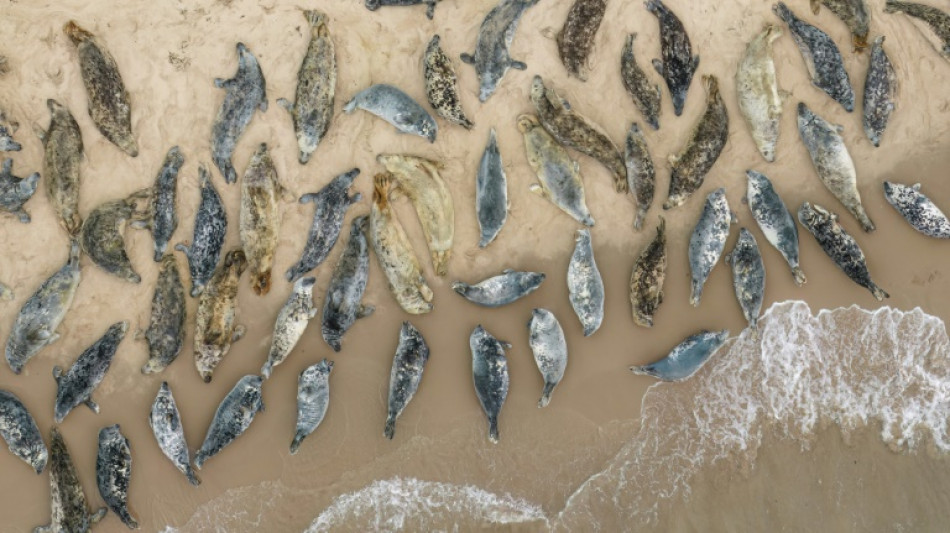
-
 Japan to restart world's biggest nuclear plant Wednesday
Japan to restart world's biggest nuclear plant Wednesday
-
South Korean ex-PM Han gets 23 years jail for martial law role

-
 Alcaraz, Sabalenka, Gauff surge into Australian Open third round
Alcaraz, Sabalenka, Gauff surge into Australian Open third round
-
Over 1,400 Indonesians left Cambodian scam groups in five days: embassy
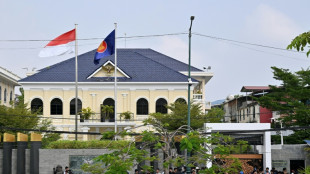
-
 Raducanu to 're-evaluate' after flat Australian Open exit
Raducanu to 're-evaluate' after flat Australian Open exit
-
Doncic triple-double leads Lakers comeback over Nuggets, Rockets down Spurs

-
 Bangladesh will not back down to 'coercion' in India T20 World Cup row
Bangladesh will not back down to 'coercion' in India T20 World Cup row
-
Alcaraz comes good after shaky start to make Australian Open third round

-
 Trump departs for Davos forum again after switching to new plane: AFP
Trump departs for Davos forum again after switching to new plane: AFP
-
Impressive Gauff storms into Australian Open third round

-
 Dazzling Chinese AI debuts mask growing pains
Dazzling Chinese AI debuts mask growing pains
-
Medvedev battles into Melbourne third round after early scare

-
 Denmark's Andresen upstages sprint stars to take Tour Down Under opener
Denmark's Andresen upstages sprint stars to take Tour Down Under opener
-
Turkey's Sonmez soaks in acclaim on historic Melbourne run

-
 Sheppard leads Rockets to sink Spurs in Texas derby
Sheppard leads Rockets to sink Spurs in Texas derby
-
Sabalenka shuts down political talk after Ukrainian's ban call

-
 Trump's plane returns to air base after 'minor' electrical issue: White House
Trump's plane returns to air base after 'minor' electrical issue: White House
-
Barcelona train crash kills 1 in Spain's second deadly rail accident in days

-
 North produces enough nuclear material a year for 10-20 weapons: S. Korea president
North produces enough nuclear material a year for 10-20 weapons: S. Korea president
-
Japan ex-PM Abe's alleged killer faces verdict

-
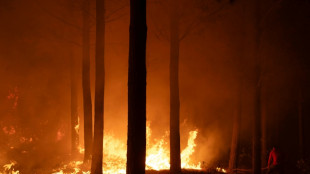 Climate change fuels disasters, but deaths don't add up
Climate change fuels disasters, but deaths don't add up
-
Stocks stable after tariff-fuelled selloff but uncertainty boosts gold

-
 What growth?: Taiwan's traditional manufacturers miss out on export boom
What growth?: Taiwan's traditional manufacturers miss out on export boom
-
'Super-happy' Sabalenka shines as Alcaraz gets set at Australian Open

-
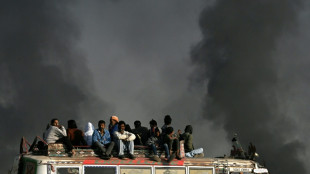 With monitors and lawsuits, Pakistanis fight for clean air
With monitors and lawsuits, Pakistanis fight for clean air
-
Sabalenka sets up potential Raducanu showdown at Australian Open

-
 Chile president picks Pinochet lawyers as ministers of human rights, defense
Chile president picks Pinochet lawyers as ministers of human rights, defense
-
Osaka says 'I'm a little strange' after Melbourne fashion statement

-
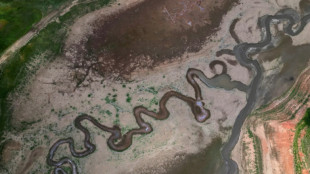 UN report declares global state of 'water bankruptcy'
UN report declares global state of 'water bankruptcy'
-
Trump heads for Davos maelstrom over Greenland

-
 Ukraine's Oliynykova wants Russian, Belarusian players banned from tennis
Ukraine's Oliynykova wants Russian, Belarusian players banned from tennis
-
Kasatkina cannot wait to be back after outpouring of Melbourne support

-
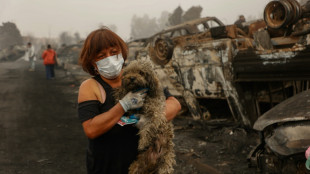 Chile blaze victims plead for help from razed neighborhoods
Chile blaze victims plead for help from razed neighborhoods
-
Russian minister visits Cuba as Trump ramps up pressure on Havana

-
 World order in 'midst of a rupture': Canada PM Carney tells Davos
World order in 'midst of a rupture': Canada PM Carney tells Davos
-
Senegal's 'historic' AFCON champs honoured with parade, presidential praise

-
 Audi unveil new car for 2026 Formula One season
Audi unveil new car for 2026 Formula One season
-
Man City humiliated, holders PSG stumble, Arsenal remain perfect

-
 Vinicius, Real Madrid need 'love' not whistles: Bellingham
Vinicius, Real Madrid need 'love' not whistles: Bellingham
-
Late Suarez winner stops Champions League holders PSG in Lisbon

-
 Frank seeks Spurs 'momentum' after beating Dortmund
Frank seeks Spurs 'momentum' after beating Dortmund
-
Jesus' 'dream' brace at Inter fires Arsenal into Champions League last 16

-
 US regulator appeals Meta's court victory in monopoly case
US regulator appeals Meta's court victory in monopoly case
-
Netflix shares fall as revenue appears to stall

-
 Tottenham beat 10-man Dortmund to hand Frank stay of execution
Tottenham beat 10-man Dortmund to hand Frank stay of execution
-
Mbappe, Vinicius help Real Madrid thrash Monaco in Champions League

-
 Men's Fashion Week kicks off in Paris with Louis Vuitton show
Men's Fashion Week kicks off in Paris with Louis Vuitton show
-
Jesus fires Arsenal past Inter and into Champions League last 16

-
 Muted anniversary: Trump marks first year back with grievances
Muted anniversary: Trump marks first year back with grievances
-
Humiliated Man City have to 'change the dynamic': Guardiola


In Quebec, seal hunters want public to see practice in new light
At the helm of his motorboat, with the wind whipping and the waves crashing, Canadian seal hunter and photographer Yoanis Menge scans the horizon.
From the port of Grosse-Ile, the northern tip of the tiny Magdalen islands archipelago in the Gulf of Saint Lawrence, he spots a group of seals sunning themselves on a sandbar.
But at the slightest noise, they move. Once in the water, hunting them is much harder. From the boat, only their little black heads stick out -- quite a narrow target.
This time, Menge and his crew complete the kill from the sandbar, shooting the seals. They skin the animals and cut them apart, saving the parts they want to keep.
Menge knows seal hunting is a controversial practice, but he says it is also an ancestral tradition for the people of the Magdalen islands and several Indigenous groups in Canada, including the Inuit.
In the islands, where seal hunting is possible year-round, on the ice or on the water, Menge and others hope to rehabilitate the image of the hunt, with the support of fishermen who are worried about dwindling fish stocks.
"Here, we live with the seals -- we don't just hunt them," says Menge, who welcomed an AFP team on a hunt in late May.
"What prompted the United States or Europe to ban seal products? These are sentimental reasons. It is the only animal boycotted for sentimental reasons."
- 'Murderers' -
Any discussion of seal hunting in the Magdalen islands inevitably comes back to the image of French movie star and animal rights activist Brigitte Bardot, who in the 1970s posed on the ice floe next to baby harp seals.
Over the years, activists have particularly objected to the clubbing of the animals.
"We were treated as savages, barbarians and murderers," recalls Gil Theriault, director of the Intra-Quebec Sealers Association.
"These insults have done us a lot of harm in the public sphere. It was an attack on our way of life," he said.
Since the 1970s, the hunt has been on the wane.
On Canada's Atlantic coast, there are gray, harp, harbor, bearded, hooded and ringed seals. Commercial hunting mainly targets the first two species.
During the 1950s and 1960s, hunters could make money from the pups' white coats, highly sought after by the fashion industry. That practice was banned in 1987.
And little by little, the doors have been closing.
The United States has banned seal products since 1972. And in 2010, the European Union imposed an embargo because of hunting methods that were deemed too cruel -- a blow for the industry, which lost 30 percent of its customers.
Today, seals are mostly hunted locally for their meat, which is served in some high-end restaurants across Quebec.
But some hope to revive interest in what Magdalen islands butcher Rejean Vigneau calls an "incredible" meat.
Vigneau makes about 15 different products from seal meat, from sausages to terrines.
"It's a local meat, without hormones, very rich in iron, lean, excellent for your health," said Vigneau, who is one of only a few dozen hunters still active in the islands, down from hundreds a few decades ago.
"It's surprising that it's still frowned upon."
- 'We have a problem' -
Some of the remaining hunters now dream of bolstering their ranks, pointing out that the seal has few natural predators, and without humans hunting them, their populations grow rapidly.
They also feed on all kinds of fish -- an adult swallows several kilos a day. That is a drain on the main source of revenue for island dwellers.
"In the Gulf, given the number of gray seals and their consumption of fish... we have a problem. Fish stocks are not going up," said fisherman Ghislain Cyr.
Simon Nadeau, a marine mammals expert with the Canadian Department of Fisheries and Oceans, explains that seal populations have exploded since the 1970s.
"But we're not talking about overpopulation," he insisted.
The number of harp seals nearly quadrupled between 1970 and 2019 to an estimated 7.6 million, according to government data.
In the Gulf of Saint Lawrence, the gray seal population increased from 5,000 in 1960 to 44,000 animals in 2017.
At the same time, fish stocks in the Atlantic Ocean off Canada are at their lowest levels on record.
For Nadeau, the two are not so easily linked, in particular because the entire ecosystem has been altered in recent decades due to global warming and overfishing.
"Seals may have contributed to the decline of fish stocks, but they did not cause it," he said, while acknowledging that they are one of the factors that prevent certain fish populations from bouncing back.
O.Lorenz--BTB




